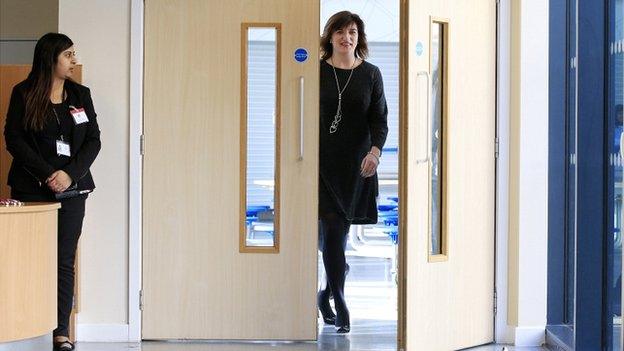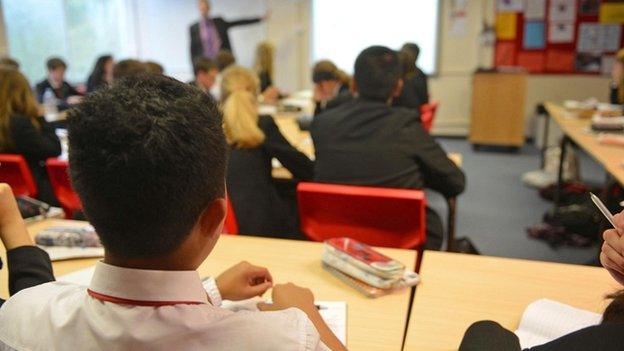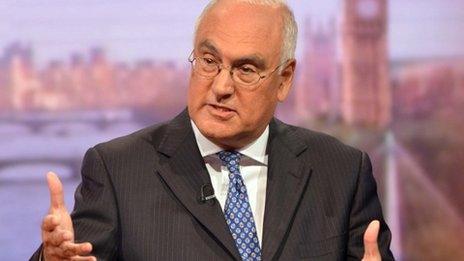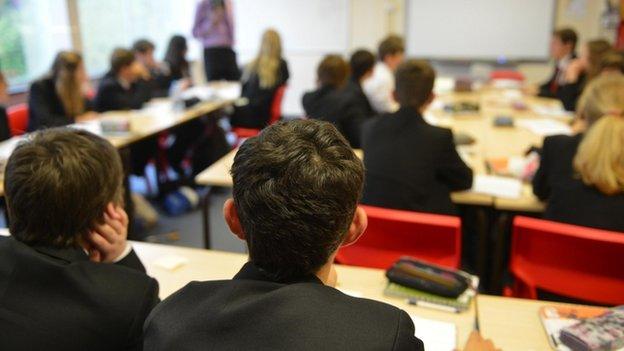England's largest academy chain 'failing too many pupils'
- Published

Nicky Morgan's Department for Education threatens "further action" if standards not raised
The biggest academy chain in England has been accused by Ofsted of "failing too many pupils".
Inspectors say that almost half of pupils at secondary schools run by the Academies Enterprise Trust (AET) are in schools that are "less than good".
Ofsted warns that poorer pupils do "particularly badly" in AET schools.
In response the trust said it was disappointed that its "significant achievements" had "not been sufficiently recognised".
The Department for Education is threatening that unless standards are raised there will be "further action".
AET runs 67 academies across England. Such academy chains are independent but publicly funded to run schools. AET has charitable status and a financial report up to August 2014 said there was annual expenditure of £333m.
'Mediocre'
Inspectors say that 40% of pupils in primary schools run by AET are in "academies that do not provide a good standard of education".
"It is even worse in secondary, where 47% of pupils attend academies that are less than good," says Ofsted.

Inspectors have accused the academy chain of making insufficient progress
The performance of AET's secondary schools is described as "mediocre" and there has been a lack of progress since Ofsted highlighted weaknesses in the chain's schools two years ago.
The report says there is a particular weakness in the progress of disadvantaged pupils.
Inspectors also warned about "unacceptably low" attendance levels.
And there was criticism of "insufficient detail" about how the trust is governed.
'Strong leadership'
Ofsted cannot give a judgement on an academy chain, but inspectors can carry out multiple inspections of individual schools it runs.
In this "focused inspection", inspectors visited seven academies and there were discussions by telephone with a further 18 schools.
AET runs schools across a wide geographical area - including the Isle of Wight, Hull, Birmingham, Essex, Leicestershire and Gloucestershire.
The trust's financial report says its expenditure of £333m included more than £9.5m on "fundraising expenses and other costs, external".
Ofsted's breakdown says four academies are rated outstanding, 35 are good, 20 require improvement, seven are inadequate and one has still to be inspected.
In response to Ofsted's findings, a statement from AET said that its "strong leadership" had seen a doubling in the number of good or outstanding academies and a reduction in those rated as inadequate.
The academy trust says the improvements made so far will be a "springboard which we are confident will enable us to achieve our vision to ensure all our pupils receive an excellent education. We have robust systems in place to sustain and accelerate progress".
'Fallen short'
Two years ago a report from inspectors accused the academy chain of "low expectations" and said that too many pupils were "not receiving a good enough education".
The chain had responded in 2014 by criticising inspectors' findings as "unfairly negative" and that "turning a school around takes time".
In response to this latest report, AET says the inspection process has "fallen short" in terms of the "consideration of achievement" by the academy chain.
Christine Blower, leader of the National Union of Teachers, said the academy chain had been allowed to expand too quickly and "this speaks to a wider problem with the chaotic system of academies and academy chains".
"The government continues to promote the expansion of academies and the growth of chains against all the evidence."
A Department for Education spokesman said: "While Ofsted's findings show that AET has made some progress, particularly in its primary academies, the trust is letting down too many of its pupils.
"The academies system allows us to spot and intervene in underperformance far more quickly than in council-run schools.
"AET must now show us how they will address the issues identified by Ofsted and we are working with them to raise standards. If we are not satisfied we will take further action."
- Published1 September 2014

- Published19 January 2016
